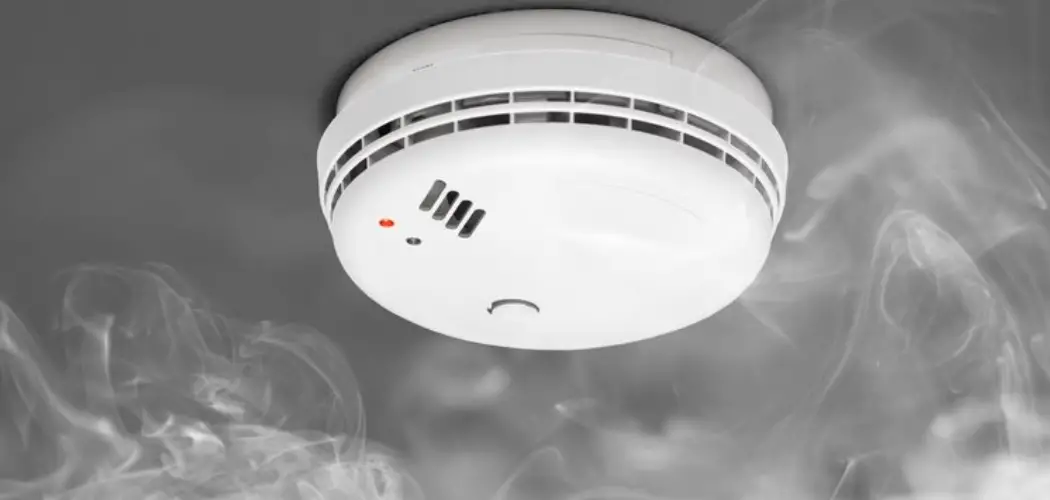The mysterious beeping of a smoke detector can catch many off-guard, especially when it’s triggered by something as harmless as a humidifier. While humidifier play a crucial role in maintaining comfortable humidity levels in our homes, particularly during the dry winter months, they can inadvertently cause smoke detectors to sound alarms.
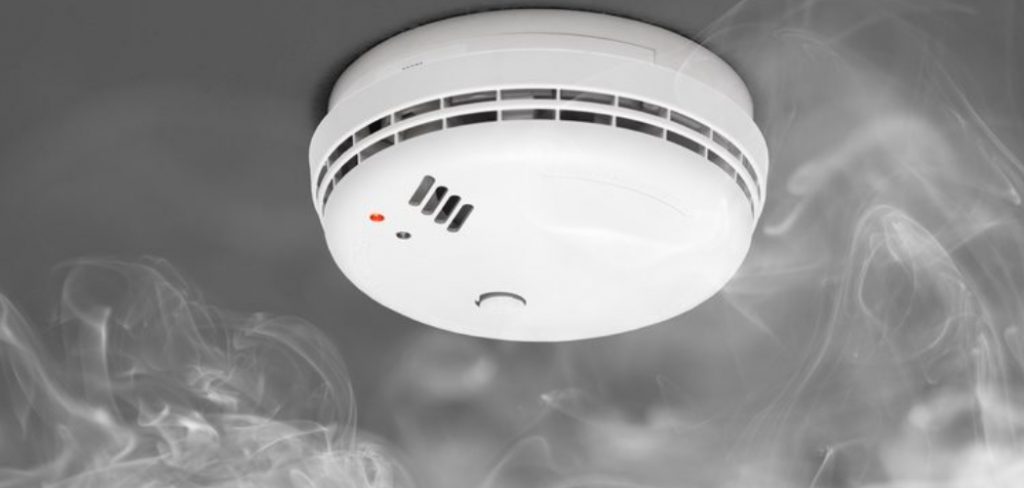
This usually happens due to the dense water vapor mist that humidifiers emit, which some smoke detectors may mistakenly interpret as smoke. Thankfully, simple adjustments and preventive measures can ensure that your humidifier and smoke detector coexist peacefully without false alarms disrupting the tranquility of your home.
This guide will walk you through some effective strategies on how to stop humidifier from setting off smoke detector , ensuring seamless, uninterrupted comfort in your living space.
What are the Causes of Smoke Detector Alarms?
Before we dive into how to prevent your humidifier from setting off smoke detector alarms, it’s essential to understand why this happens in the first place.
- Water Vapor Mist: As mentioned earlier, the dense water vapor released by a humidifier can trigger a smoke detector, as it may be mistaken for smoke particles.
- Dust and Dirt Buildup: Over time, dust and dirt can accumulate on smoke detector sensors, making them more sensitive and prone to false alarms.
- Low Batteries: Smoke detectors with low batteries may be triggered by humidity levels that would not have otherwise set off the alarm if the battery was at full power.
These are the three most common causes of smoke detector alarms in relation to humidifiers. Now, let’s explore some preventative measures you can take to ensure that your humidifier doesn’t set off your smoke detector.
What are the Benefits of Preventing False Alarms?
Before we get into the specifics, it’s essential to understand why preventing false alarms is crucial. Here are some benefits of ensuring that your humidifier doesn’t set off your smoke detector unnecessarily:
- Avoid Disruption: False alarms can be noisy and disruptive, especially if they happen in the middle of the night. By taking preventive measures, you can avoid these interruptions and maintain a peaceful living space.
- Save Batteries: Constant false alarms can drain the batteries of your smoke detector, leading to decreased effectiveness. By preventing false alarms, you can save on battery costs and ensure that your smoke detector is always functioning at optimal levels.
- Avoid Panic: Smoke detectors are designed to alert us in the event of a fire, and constant false alarms can desensitize us to their warnings. By preventing false alarms, we can ensure that our smoke detectors are only triggered when there is an actual emergency, avoiding unnecessary panic.
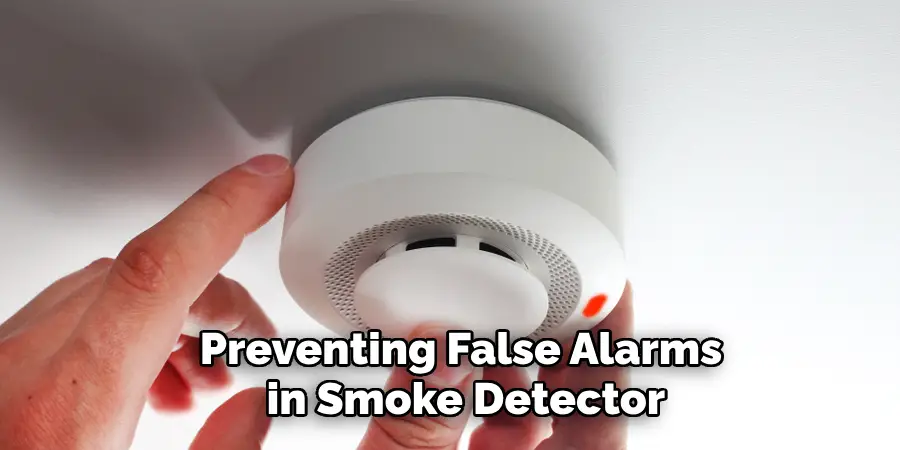
With the benefits of preventing false alarms in mind, let’s explore some practical ways to stop your humidifier from setting off your smoke detector.
What Will You Need?
The following items are recommended for implementing the preventive measures discussed in this guide:
- Humidifier: Of course, you’ll need a humidifier to follow along with this guide. Make sure it is properly sized for your living space and in good working condition.
- Smoke Detector: Ideally, it would be best if you had a smoke detector that meets the necessary safety standards and is equipped with the latest technology to reduce false alarms.
- Cleaning Supplies: Some basic cleaning supplies such as a microfiber cloth and rubbing alcohol will come in handy for maintaining your smoke detector.
- Water Distiller (Optional): If you are using tap water in your humidifier, consider investing in a water distiller to remove impurities that can cause buildup on your smoke detector’s sensors.
Once you have all the necessary items, you’re ready to implement these preventative measures and stop your humidifier from triggering your smoke detector.
10 Easy Steps on How to Stop Humidifier From Setting Off Smoke Detector
Step 1. Placement is Key:
One of the most straightforward ways to prevent your humidifier from setting off your smoke detector is mindful placement. Positioning your humidifier away from the direct line of sight to the smoke detector significantly reduces the chances of vapor mist being mistaken for smoke.
Ideally, keep the humidifier in the lower part of the room since water vapor rises, and smoke detectors are usually mounted on the ceiling or high on the wall. Furthermore, ensuring at least a few feet of distance between your smoke detector and the humidifier will allow the vapor to disperse and mix with the room’s air before reaching the detector. This simple adjustment can be the first line of defense against unwarranted disruptions.
Step 2. Regular Maintenance:
Maintaining your humidifier and smoke detector through regular cleaning is crucial in preventing false alarms. For the humidifier, ensure it’s emptied, cleaned, and dried daily to prevent mold and bacteria growth, which can contribute to sensor sensitivity in smoke detectors.
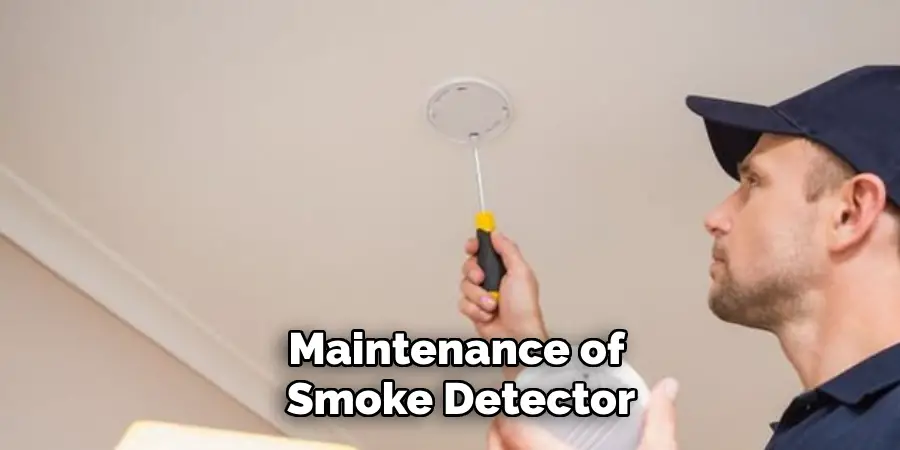
For smoke detectors, use a microfiber cloth to gently wipe away any dust or dirt from the exterior casing and sensors, ideally every few months. You can also use compressed air to blow away any particles from inside the detector. This routine maintenance not only prevents false alarms but also extends the life of your devices, ensuring they function correctly when you need them most.
Step 3. Adjust Humidifier Settings:
If your humidifier has adjustable settings, optimize them to maintain a balance that prevents excess moisture—which could trigger your smoke detector—while still achieving your desired humidity level. Start with a lower setting and gradually increase it as needed, monitoring the response of your smoke detector.
This approach allows you to find the sweet spot where your humidifier effectively increases the room’s humidity without producing so much vapor that it sets off the alarm. In many cases, a moderate setting is sufficient to keep the air comfortable without risking a false alarm from your smoke detector.
Step 4. Use Distilled Water:
Utilizing distilled water in your humidifier can significantly reduce the potential for false alarms from your smoke detector. Tap water often contains minerals that can be dispersed into the air along with the water vapor. When these mineral particles reach the smoke detector, they can be mistaken for smoke or combustion particles, triggering an alarm.
Distilled water, being free of these minerals, produces a cleaner mist that is less likely to cause sensor contamination. This simple switch not only prevents false alarms but also helps in maintaining the cleanliness and efficiency of both your humidifier and smoke detector.
Step 5. Test Your Smoke Detector Regularly:
Regular testing of your smoke detector is an essential step in ensuring that it is functioning correctly and not overly sensitive to the mist from your humidifier. Most smoke detectors will have a test button that, when pressed, will cause the alarm to sound if working correctly. It’s advisable to do this testing whenever you clean your smoke detector or at least once a month.
This way, if your smoke detector is too sensitive and triggers false alarms due to the humidifier’s mist, consider replacing it with a model designed to differentiate more effectively between smoke and water vapor. Regular testing not only helps in maintaining the safety of your home but also ensures that your efforts to prevent false alarms from your humidifier are effective.
Step 6. Install a Humidity Monitor:
Consider installing a humidity monitor to gain better control over your home’s humidity levels and further prevent your humidifier from setting off the smoke detector. This device will help you keep track of the humidity levels in real-time, allowing you to adjust your humidifier settings accordingly.
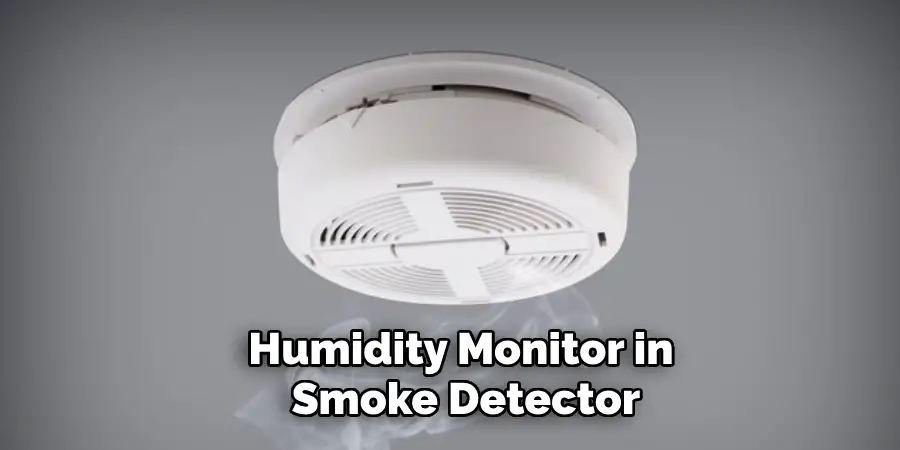
Having a humidity monitor ensures that you can maintain optimal moisture levels without inadvertently creating an environment prone to triggering your smoke detector. It’s a cost-effective way to manage the balance between too much and too little humidity, safeguarding your home against both false alarms and uncomfortable air conditions.
Step 7. Ventilate the Room:
Improving the ventilation in the room where the humidifier is used is crucial for preventing the humidifier’s mist from accumulating and setting off the smoke detector. Open windows or use fans to circulate air and distribute humidity evenly throughout the room. This helps in reducing moisture levels in the air that could otherwise trigger the smoke detector.
Effective ventilation ensures that the vapor from the humidifier does not become concentrated in one area, which is especially important in rooms with poor natural airflow. By implementing good ventilation practices, you can significantly lower the risk of false alarms while maintaining a comfortable indoor environment.
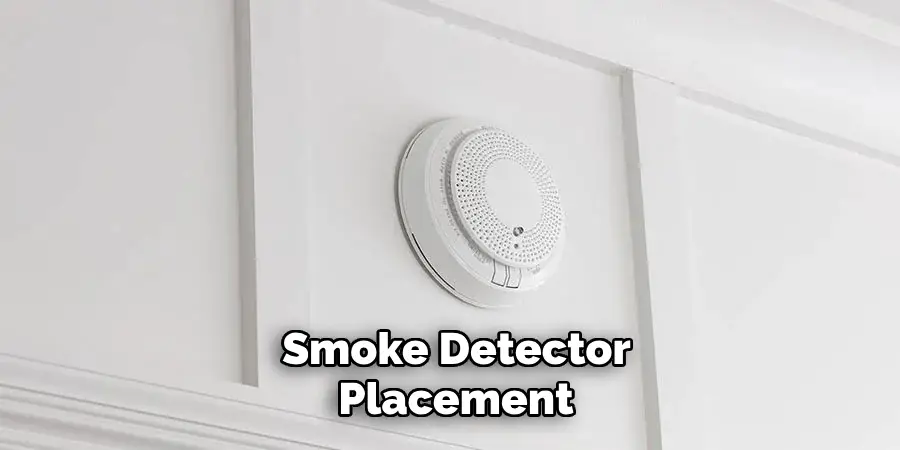
Step 8. Consider Smoke Detector Placement:
Reevaluating the placement of your smoke detector can also be an effective strategy if you’ve tried the above steps without success. Despite your best efforts, some rooms may naturally have higher humidity levels or less airflow, making it challenging to prevent the humidifier’s mist from reaching the smoke detector.
In these cases, it may be practical to relocate the smoke detector to a slightly different position within the room or to another area where it’s less likely to be affected by the humidifier. Consult with a professional to ensure that any changes still comply with safety standards and that your home remains adequately protected from the threat of fire.
Step 9. Use a Smart Smoke Detector:
Upgrading to a smart smoke detector can offer advanced features that reduce the likelihood of false alarms from humidifier use. These detectors are equipped with sophisticated sensors that can differentiate between smoke particles and other types of particles, such as those from steam or humidifier mist.
Additionally, smart smoke detectors can be connected to your home Wi-Fi network, allowing you to monitor and control settings through a smartphone app. This connectivity enables you to quickly address any false alarms that may occur, even when you’re not at home. Furthermore, smart smoke detectors often allow for the adjustment of sensitivity levels, providing an added layer of prevention against false alarms triggered by humidity.
Step 10. Periodic Maintenance of Both Devices:
Ensuring that both your humidifier and smoke detector undergo periodic maintenance is crucial for their optimal functioning and for preventing false alarms. For the humidifier, regular cleaning according to the manufacturer’s instructions will prevent mold growth and the buildup of minerals from the water, which could contribute to false alarms.
For the smoke detector, dust and spider webs can interfere with the sensor’s ability to function correctly. Use a soft brush or a can of compressed air to gently clean the outside of the detector. Both devices should also be checked for any signs of wear or malfunction. This routine maintenance helps minimize the chances of false alarms and extends the life of both your humidifier and smoke detector, ensuring they operate efficiently and effectively.
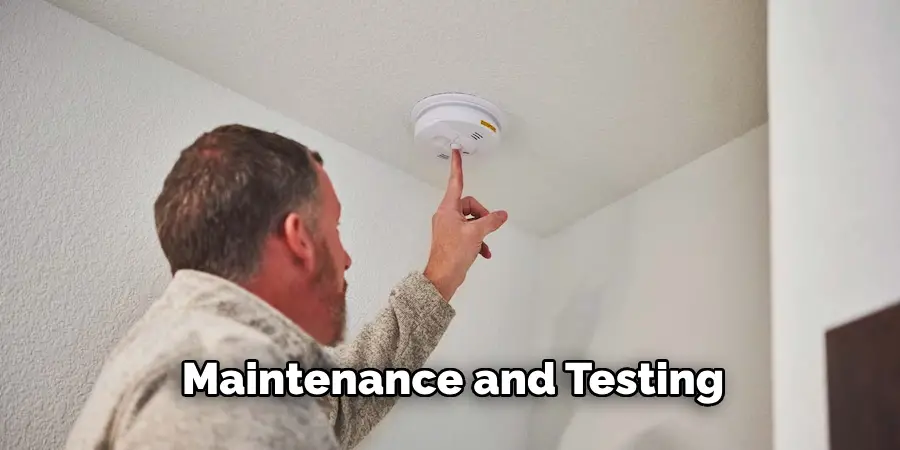
By following these steps, you can effectively prevent your humidifier from setting off the smoke detector and alleviate any concerns about false alarms.
5 Additional Tips and Tricks
- Location Matters: Place your humidifier at least a few feet away from the smoke detector. This helps to prevent direct moisture from reaching the detector, which can trigger an alarm.
- Control Humidity Levels: Use a hygrometer to monitor the room’s humidity. Maintaining a comfortable but not excessive level (between 30% and 50%) can help prevent the humidifier from producing too much steam.
- Consider a Cool Mist Humidifier: Opt for a cool mist humidifier instead of a warm mist one. Warm mist humidifiers produce more steam and can increase the chances of setting off a smoke detector.
- Clean and Maintain Regularly: Ensure that your humidifier is cleaned and maintained regularly to prevent mineral buildup, which can affect its functioning. Follow the manufacturer’s instructions for proper cleaning and maintenance.
- Keep Doors and Windows Closed: If your humidifier is causing issues with the smoke detector, try to keep doors and windows closed when it’s in use. This helps contain the moisture within the room and prevents it from reaching the detector.
With these additional tips and tricks, you can effectively use a humidifier without worrying about it setting off your smoke detector.
5 Things You Should Avoid to Prevent Your Humidifier from Setting Off Smoke Detector
- Do Not Overfill the Humidifier: Adding too much water to your humidifier can lead to excess humidity output. This not only increases the risk of setting off the smoke detector but can also promote mold growth in your environment.
- Avoid Placing It Directly Under Smoke Detectors: Some sensitive detectors can detect even a slight mist as smoke. Positioning the humidifier directly under a smoke detector significantly raises the likelihood of false alarms.
- Do Not Ignore Regular Maintenance: Failing to clean your humidifier can lead to a buildup of minerals and bacteria. This not only poses health risks but can also lead to the humidifier malfunctioning and emitting excessive steam.
- Steer Clear of High-Output Settings in Small Spaces: Using a humidifier on its highest setting in a small room can quickly saturate the air. This dense moisture can easily be mistaken for smoke by detectors, especially in enclosed spaces.
- Refrain from Using It in Poorly Ventilated Areas: Good air circulation is key to evenly distributing moisture and preventing concentrations that could reach and activate the smoke detector. Always ensure the room is well-ventilated when using a humidifier.
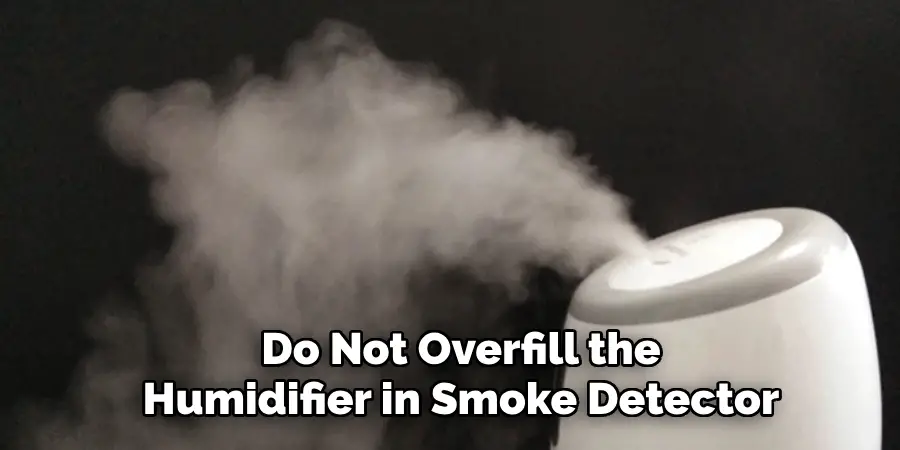
By avoiding these common pitfalls, you can enjoy the benefits of your humidifier without the inconvenience of frequent smoke detector alarms.
Is It Bad to Inhale Humidifier Smoke?
Many people wonder if they should be concerned about inhaling the steam produced by humidifiers. While there are some potential risks, it is generally not harmful to inhale “smoke” from a humidifier. However, it is important to use your humidifier properly and follow safety precautions.
Here are a few things to keep in mind:
- Distilled or demineralized water is used to prevent mineral buildup and potential health risks from inhaling impurities.
- Keep the humidifier clean and well-maintained to avoid bacterial growth, which can lead to respiratory infections.
- Do not use essential oils or other additives in your humidifier unless approved by the manufacturer. These can cause damage and affect air quality.
- Make sure the room is adequately ventilated to prevent excessive moisture buildup and avoid inhaling concentrated levels of steam.
Overall, as long as you use your humidifier responsibly, there should be no major concerns about inhaling the steam it produces. However, if you experience any negative effects, such as coughing or difficulty breathing while using a humidifier, consult a doctor and discontinue use until further guidance is provided.
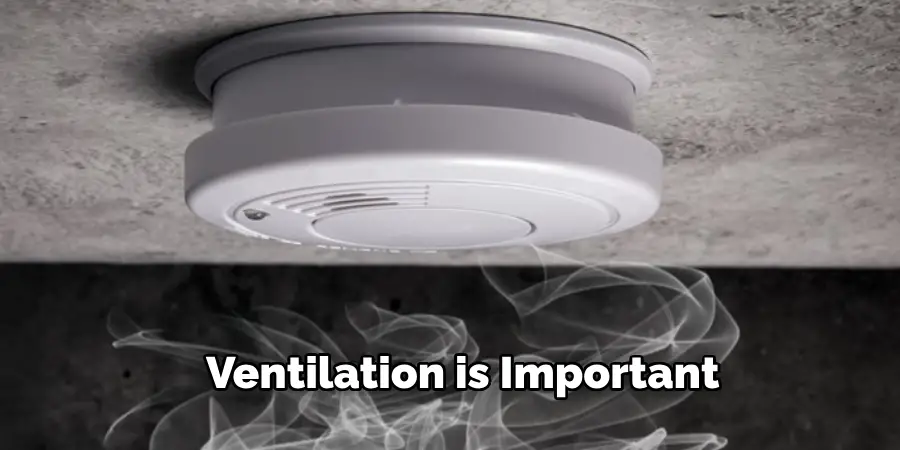
Conclusion
In conclusion, preventing your humidifier from triggering a smoke detector involves a blend of strategic placement, proper maintenance, and the use of appropriate settings and water types. You can mitigate the risk of false alarms by adhering to the tips and cautionary measures outlined, such as positioning humidifiers away from detectors, using distilled water, and ensuring regular cleaning.
Additionally, understanding the importance of ventilation and humidity levels within your environment plays a crucial role in maintaining a balance between the benefits of using a humidifier and ensuring the safety and effectiveness of smoke detectors. Through these practices, you can enjoy the comfort and health benefits of a humidifier without unnecessary disturbances from smoke detector alerts.
Hopefully, the article on how to stop humidifier from setting off smoke detector has provided valuable insights and practical solutions to help you use your humidifier efficiently and safely. Keep these tips in mind, and enjoy the many benefits that a well-maintained humidifier can bring to your home. Happy humidifying!

